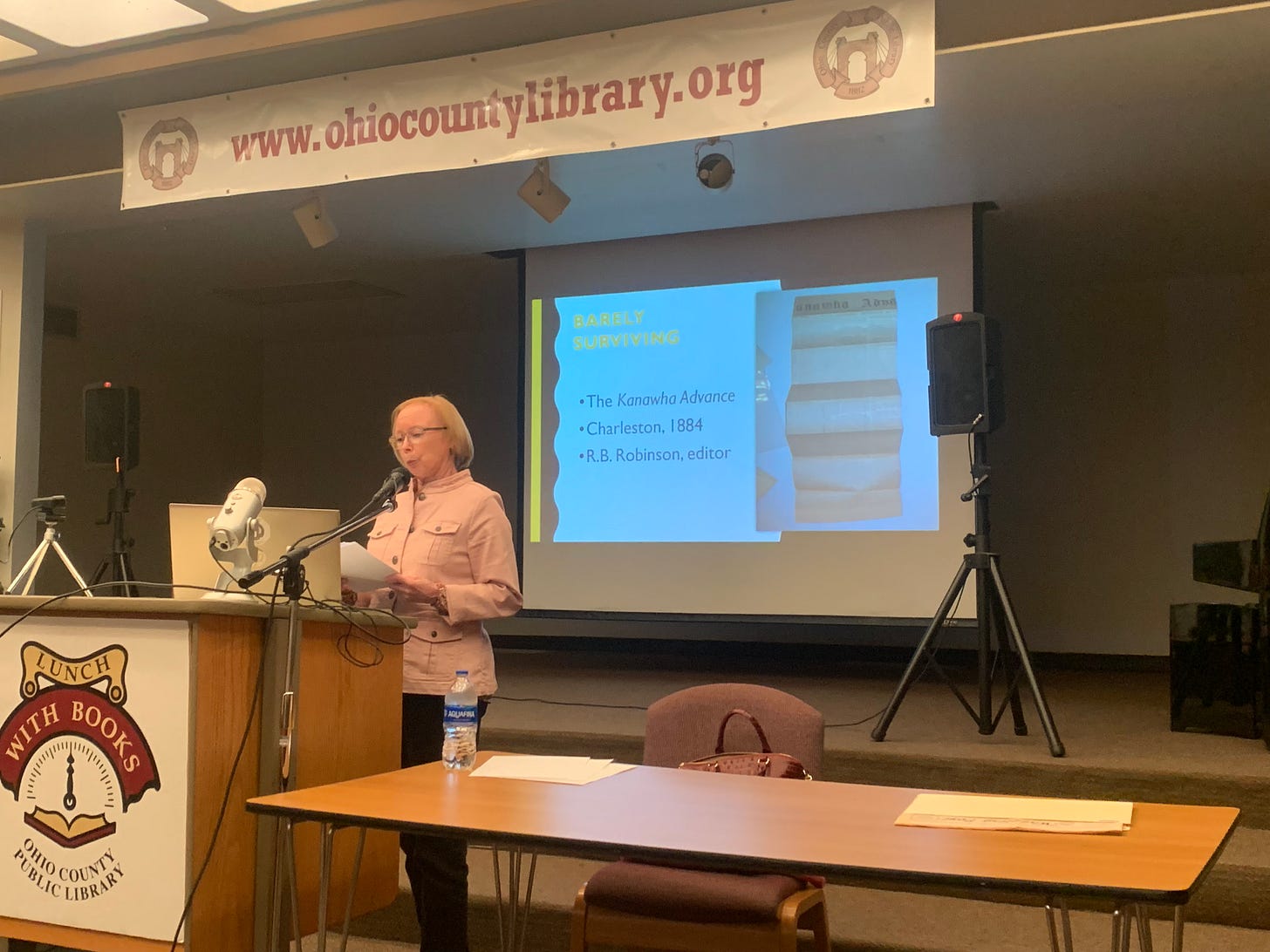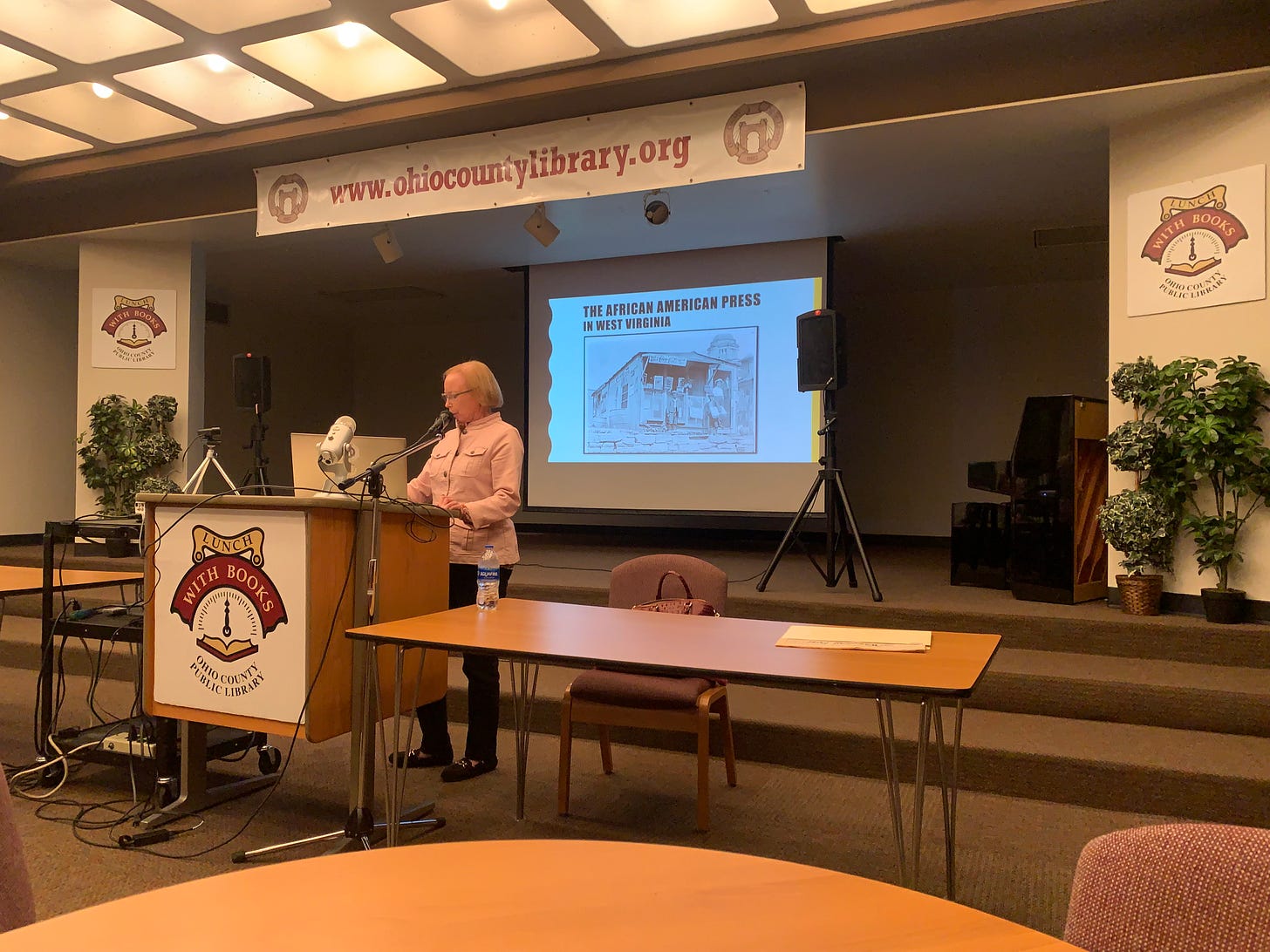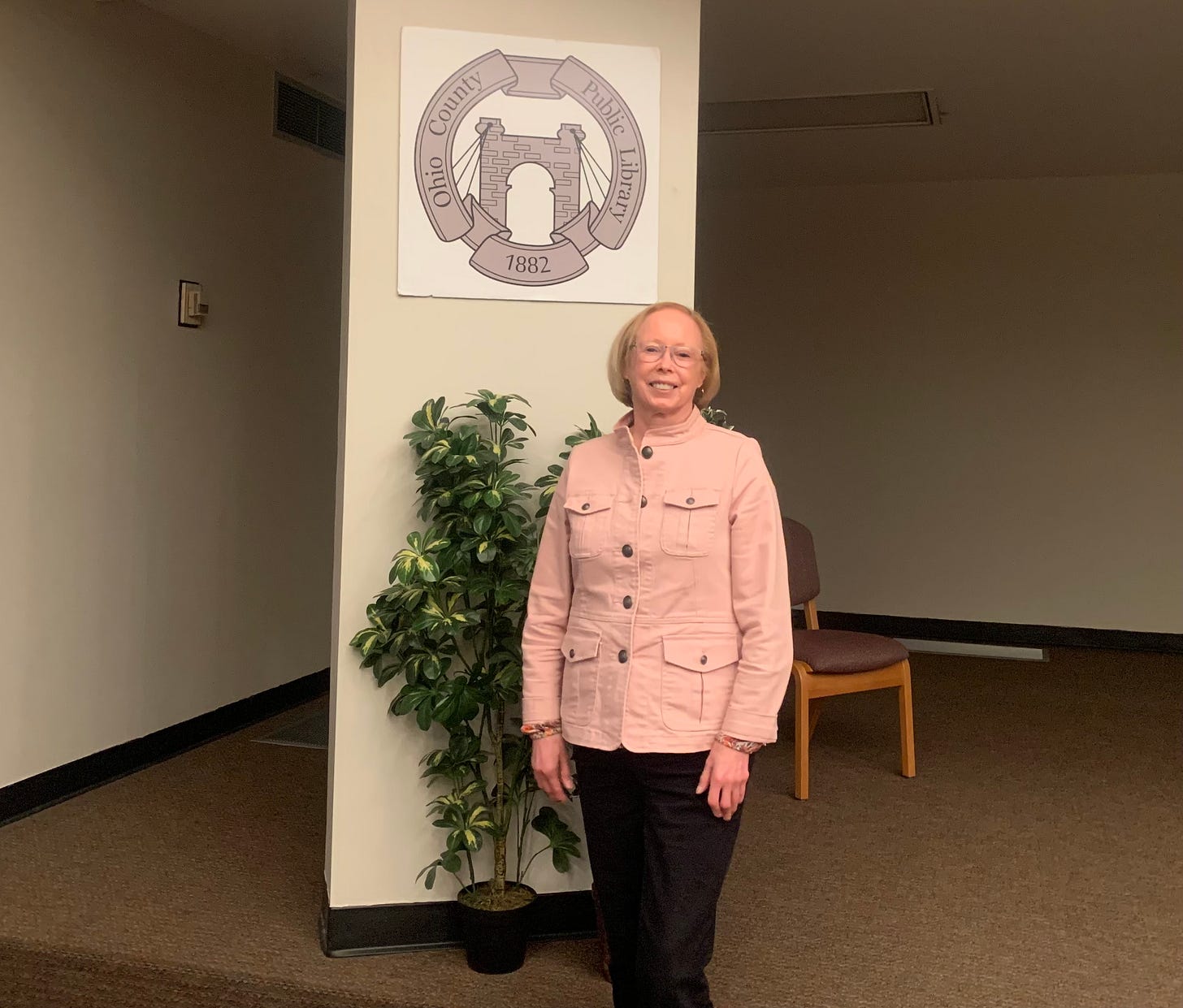A History of Black Press in West Virginia
A recap of a presentation given by Ms Stewart Plein, Curator of Rare Books and Printed Resources at WVU's West Virginia and Regional History Center, at the OCPL for "Lunch With Books."
On Tuesday, March 28, 2023, the Ohio County Public Library welcomed Ms Stewart Plein, Curator of Rare Books and Printed Resources and the West Virginia and Regional History Center at West Virginia University, as the next speaker in a series known as “Lunch with Books”. Plein spoke to a crowd of roughly 30 people about the history of Black press in West Virginia, specifically Black-centered newspapers.
Ms Stewart Plein, originally from Abingdon, Virginia (what some consider “far Appalachia”), moved to Morgantown in 1992. Previously working as a bookseller, Plein became fascinated with rare books at a conference in Colorado where the speaker implored the audience to volunteer with their local rare book projects.
After gaining a Masters in Library Science –noting her goal was to graduate before she was 50, achieving this just days before her 50th birthday– Ms Plein first began volunteering at West Virginia University in 2004. The first project in this capacity Ms Plein worked on —a project that took her four years— was a collection of rare books spanning the 15th century to the 20th century.
I asked Ms Stewart Plein what made her want to research the history of Black press in West Virginia, to which she responded that she believed the Rare Book room at West Virginia should be a representation of all West Virginians– including the many Black people who have called this state home for centuries. She continued, saying this work is crucial and will continue, grant or no grant.
Plein began her conversation about the history of Black press in West Virginia by acknowledging the community of people before her who have helped in locating and archiving Black-centered newspapers in the state. Crystal Good, BlackByGod founder, John Mullins, The Lion of Anacostia author, Armistead S. Pride, considered the father of modern Black newspaper research, and the National Digital Newspaper Project –which funds her work– through the Library of Congress.
From the first Black-centered newspaper, The West Virginia Freeman (later renamed The Freeman) to the most recent, BlackByGod, there have been dozens of publications, often focusing on Civil Rights, the temperance movement, uplifting stories, and local & world events.
In her work at West Virginia University’s WV and Regional History Center, Ms Plein and her staff have identified 48 Black newspapers– not counting one, The Wheeling Post, which she was made aware of briefly before giving her presentation.

Ms Stewart Plein continuously noted throughout her presentation that her list, and no list, is comprehensive. Showing off the only surviving edition of The Kanawha Advance –published from 1901-1913– which consisted of the middle third of the first page Ms Plein demonstrated how difficult the task of finding and archiving these papers can be.
Speaking on challenges, Ms Plein noted duplicative naming, a failure of the historical record, and the fact that most Black papers were weekly or monthly leaving fewer copies to potentially survive.
Many of the papers Ms Stewart Plein has identified over the years came in the form of “announcements” included in other publications. Also of use has been the “West Virginia Blue Book,” a yearly publication by the West Virginia Legislature detailing, among other current information, what newspapers existed at the time.
The story of Black press in West Virginia, for me, became a story of influential Black people as well. While state history is a mandatory class for all seventh grade students, the most I remember being told about Black history was John Henry– a folk tale. Ms Plein pointed out several notable founders of Black press.
J McHenry Jones was the editor of The Advocate. Mr Jones was an educator by trade serving as principal for the former Lincoln School in Wheeling, West Virginia, (now known as the Ronald C. Mulholland Juvenile Center), and the West Virginia Colored Institute in Institute, West Virginia, (now known as West Virginia State University). As mentioned, only ⅓ of the first page of an edition survives today. The first edition of another publication by Mr Jones –Hearts of Gold– is available for viewing at the West Virginia and Regional History Center.
Christopher H Payne, educator, minister, and the first Black elected official in the West Virginia Legislature, was the founder of the West Virginia Enterprise in 1885. The editor for this paper described it as a “handsome” new colored paper in Charleston. While only three editions of this paper are known, we are able to learn a lot from them. For example, we know this paper sold for 5 cents, or roughly $1.55 in 2023 dollars.
We also learn from these surviving editions that these papers, and many from the late 19th century, often used “interesting” or unique stories to capture reader’s attention. In one of the West Virginia Enterprise publications a headline reading “OUR DEAD PRESIDENTS: How they died and where they’re buried.” While comical, it shows us how this style of journalism continues today.
While some papers had small, localized subscriber bases, others reached statewide and nationwide attention. The Sentinel, published in Fayette County from 1904 to 1923, garnered 1200 subscriber. The Pioneer Press, founded by JR Clifford –the first black attorney in West Virginia– in Berkeley County, is the earliest example of a Black-centered newspaper sent nationwide. And the McDowell Times, from Keystone, McDowell County, was a labor and Lincoln-style Republican political newspaper with 15,000 copies being circulated. The founder and editor of the McDowell Times, MT Whittico, described his the Black population of McDowell County as being, “more politically organized than in any county south of New York.”
These historic papers often suffered from a lack of subscribers. As well, workforce, printing machines, materials, and advertisers were challenges for early Black press. Ms Plein recognized that the problem with a consistent subscriber base continues to threaten publications today.
Because of the work of Ms Plein, the staff and volunteers of the West Virginia and Regional History Center, and all those who have carried this torch over the decades, four of the surviving Black newspapers (The West Virginia Freeman, The Advocate, the McDowell Times, and the Pioneer Press) have been digitized and are available to view through Chronicling America.
Ms Stewart Plein ended her presentation by again saying this is not a complete list, and asking for the community’s help. If you have information about a historic newspaper you can reach Ms Plein by email (stewart.plein@mail.wvu.edu) or by phone (304) 293-0345.
Want to read more about the first Black newspaper in West Virginia, the West Virginia Freeman? Check out this article originally on The Lion of Anacostia and re-published to BlackByGod. And while you’re there make sure to donate or subscribe to BlackByGod to support our most recent Black newspaper!
To see a list of upcoming events at the Ohio County Public Library, including a presentation about Urban Renewal and the Destruction of Black Neighborhoods in Wheeling (4/4/23) & Frank X Walker (4/11/23), the first Black poet laureate from Kentucky, click here.
Lunch with Books is a free series through the Ohio County Public Library and streamed live on their YouTube page.



